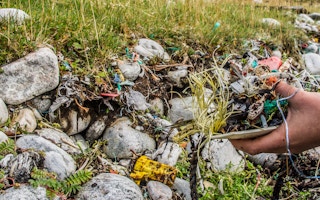The Indonesian government has launched a program that will pay thousands of traditional fishers to collect plastic trash from the sea. The four-week initiative is part of wider efforts to cut marine plastic waste by 70 per cent by 2025.
The Ministry of Marine Affairs and Fisheries said on Oct. 4 that it had budgeted 1.03 billion rupiah ($67,600) to pay 1,721 fishers across the archipelago for any plastic trash they collected daily from Oct. 1-26.
It said the money, which works out to about 150,000 rupiah ($10) per fisher per week, would serve as compensation for their not fishing during this period. That’s slightly more than the 140,000 rupiah ($9) per week that the ministry estimates they earn from fishing.
“This activity is very simple,” Sakti Wahyu Trenggono, the fisheries minister, said at a press conference in Jakarta, adding that it wasn’t expected to be the silver bullet for the country’s marine waste problem. “But at least this will raise awareness among the stakeholders at sea and the people around the world.”
The fisheries ministry says it expects each fisher to collect up to 4 kilograms (9 pounds) of plastic trash daily during the program. Participants are located across all of Indonesia’s main islands.
Indonesia is one of the largest contributors to marine plastic pollution in the world. The country produces about 6.8 million metric tons of plastic waste annually, according to a 2017 survey by the Indonesia National Plastic Action Partnership. Only 10 per cent of that waste is processed in the approximately 1,300 recycling centres in the country, while nearly the same amount, about 620,000 metric tons, winds up in the ocean.
“
This is an important moral message to the world that dumping plastic waste into the sea is very bad. Hopefully this can be a nationwide effort and, even better, a worldwide action.
Sakti Wahyu Trenggono, fisheries minister, Indonesia
Marine plastic waste poses a threat to marine animals, who can become entangled in it or ingest it. This leads to suffocation, starvation, or drowning. Marine plastics have been blamed for the deaths of more than 100,000 marine mammals annually. If the dumping of plastic in the oceans continues at current rates, by 2050 it will outweigh all fish biomass, according to an estimate.
“The most important thing is prevention,” Sakti said. “If we can properly conduct prevention, then there shouldn’t be any waste in the sea. Because once the trash gets to the sea, then it’s already damaged.”
Indonesia plans to spend $1 billion to cut 70 per cent of its plastic waste by 2025. Proper management of plastic waste is lacking in coastal communities, where the use of plastics far outpaces mitigation efforts such as recycling.
Beach cleanups are among the popular measures being carried out here. Local governments are also implementing efforts to reduce the consumption of single-use plastics, including outright bans, while the private sector is investing in sustainable alternatives. The government also plans to make producers take greater responsibility for the waste generated by their products.
“This is an important moral message to the world that dumping plastic waste into the sea is very bad,” Sakti said. “Hopefully this can be a nationwide effort and, even better, a worldwide action.”
This story was published with permission from Mongabay.com.










